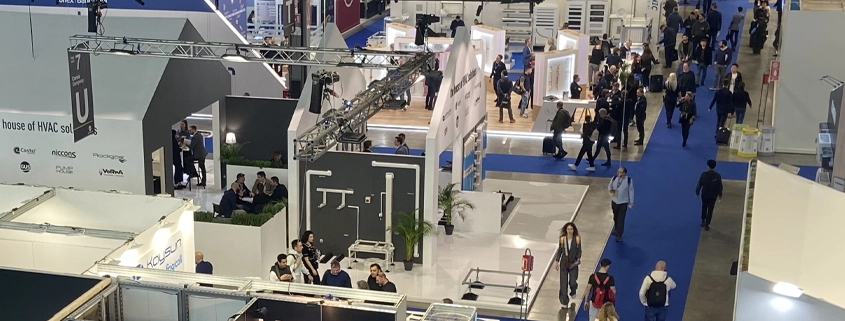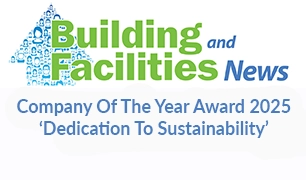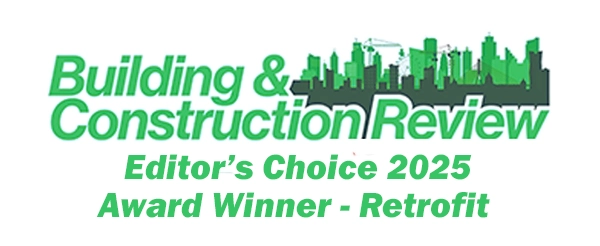Adveco reports on the European perspective for a sustainable future from the floor of Mostra 2024 in Milan, Italy.
The biannual MCE – Mostra Convegno Expocomfort, has become a major focal point for those showcasing advancements in the HVAC (Heating, Ventilation, and Air Conditioning) and plumbing sectors. This year’s event has placed a firm emphasis on sustainability, with manufacturers unveiling energy-efficient technologies, green building materials, and smart systems focused on reducing environmental impact.

There are also strong trends on the exhibition floors building on sustainability, including biomimicry and artificial intelligence. Sustainability remains a core theme throughout Mostra 2024. A large proportion of the exhibits have highlighted the use of recycled materials, eco-friendly production processes, and products designed for longevity and easy repair. There is also a growing emphasis placed on the circular economy, where resources are kept in use for as long as possible, minimising waste and environmental impact.
As always, Italian design remains a major draw at Mostra, and designers are increasingly prioritising user experience and wellbeing. Products are being created to promote comfort, functionality, and a sense of connection with nature. This is evident in the rise of biophilic design principles and biomimicry, whereby designers are not only incorporating natural elements and materials into living and workspaces to enhance user well-being but are also seeking to emulate nature’s responses to address real-world challenges. Examples on display included utilising self-regulating temperature control inspired by animal adaptations.

At the other extreme, we have technology-driven approaches with design being shaped by artificial intelligence (AI). Several companies are showcasing AI-powered tools for product development, architectural planning, and interior design. These tools offer features like personalised design recommendations, material optimisation, and automated prototyping, aiming to streamline the design process and enhance efficiency.
The line between physical and virtual is also blurring, several exhibitors offered immersive virtual tours of their products, showcasing design concepts within a digital space enabling remote collaboration between designers, manufacturers, and clients globally. Others let the robots do the talking with automated production lines on display.

In terms of hot water provision, there were expected trends and surprises. The proliferation of heat pumps was clear, and whilst most offered appliances based on R32 refrigerant, there was a clear drive to deliver lower GWP systems based on propane (R290) as the refrigerant of choice. Most of these units were intended for the domestic setting, but higher output, high-temperature versions were on display and we can expect these to proliferate in the market later this year and through 2025.

Whilst many supplies of gas water heating were citing hydrogen blend ready appliances, the Hydrogen Hub was drawing attention for its more holistic vision of an Italy with a nationwide 100% hydrogen network, there were only a few actual systems on display. As in the UK, the EU remains one to watch in terms of the widespread adoption of green gas as an answer to net zero targets. Given the low-key stance on hydrogen, it was also somewhat surprising to see solar systems, both PV and solar thermal having a smaller footprint on the show floor than in previous years. Especially given the recent discussions highlighting a greater need for the technology, especially on public buildings across EU states. In another two years this is one trend that could well have reversed on the exhibition floor.

Crucially Mostra is not just a platform for showcasing products, it also serves to foster dialogue and collaboration within the design and technology sectors to shape a future. Mostra 2024 paints a picture of a design landscape driven by innovation, sustainability, and a focus on human well-being. The integration of AI, the rise of the metaverse, and the increasing emphasis on biomimicry offer a glimpse into the exciting future of design.
While Mostra 2024 focuses heavily on advancements in design and technology, specific legislative updates regarding European commercial hot water systems tend not to be so directly addressed, but anticipated future directions are set to have a major influence on continental Europe and by default will influence or directly sway thought in the UK.
Sustainability legislation currently addresses three key pillars, energy efficiency, renewable energy integration and water conservation.
The continuous push for increased energy efficiency is regarded as the key driver. This translates to regulations mandating minimum energy performance standards for water heaters and boilers. Manufacturers are constantly innovating to meet these evolving standards, leading to the development of more efficient heating technologies. Encouraging the use of renewable energy sources for hot water generation tends to sit at a national legislative level incentivising or mandating the use of solar thermal collectors, heat pumps, or biomass boilers in commercial settings. Regulations promoting water-saving measures are also gaining traction. This might involve mandating specific water usage limits for hot water systems or encouraging the installation of water-efficient fixtures and technologies.
The Energy Performance of Buildings Directive (EPBD) is the current overarching framework for setting minimum energy performance requirements for new and renovated buildings in the EU. It indirectly impacts hot water systems by promoting energy-efficient solutions for heating and domestic hot water production. The Ecodesign Directive sets the requirements for energy-related products, including water heaters and boilers. These requirements focus on improving energy efficiency, reducing energy consumption, and promoting the use of renewable energy sources.
Looking forward, the greatest change is expected to sit with the revision of the Ecodesign Directive, which is replaced by a new regulation called the Ecodesign for Sustainable Products Regulation (ESPR). ESPR will expand beyond just energy-related products, aiming to encompass a much broader range. This could include furniture, textiles, electronics, and more.
Energy efficiency remains important, but the ESPR places greater emphasis on broader environmental aspects. This includes considerations like minimising material use and promoting the use of recycled materials, extending product lifespan and strengthening existing ‘Right to Repair’ initiatives. This is intended to help further facilitate repairs to reduce waste, requiring products be designed to better support disassembly and re-use of components at the end of their lifespan. This circularity also means it is likely to aim to further limit the use of hazardous materials in products.
The changes are, unsurprisingly expected to further tighten energy efficiency requirements for water heaters and boilers. One way to achieve this will be the introduction of a ‘digital passport’, a digital record containing information about a product’s composition, materials, and manufacturing processes. This aims to improve transparency and facilitate responsible sourcing and recycling.
Overall, the proposed revisions aim to move beyond just energy efficiency and establish a more comprehensive framework for promoting sustainable product design, production, and consumption within the European Union.
Building on this evolving EU framework, individual EU member states can implement further, stricter regulations. These might involve additional energy efficiency targets, specific requirements for renewable energy integration, or water conservation measures tailored to their national context.
What is clear from Mostra 2024 is that the prioritisation of energy efficiency and sustainability remains front and centre of conversation. Businesses are preparing to adhere to future regulation changes, which will no doubt drive greater demand for incorporating renewable energy sources and smart technologies to further optimise their hot water systems.
For the latest legislative developments visit the European Commission website: https://commission.europa.eu/index_en and search for either Ecodesign or Energy Performance of Buildings.
















